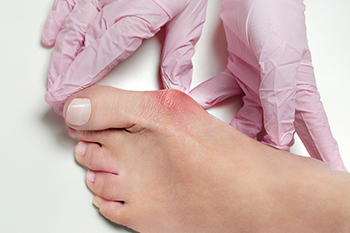
A bunion is a bony growth that develops at the base of the big toe when the joint becomes misaligned. Bunions are often the result of inherited foot structure problems, such as flat feet or joint looseness. Over time, the top of the toe leans inward, causing pain, swelling, and difficulty walking. Bunions can lead to complications, if ignored. Bursitis, which is inflammation of the joint's fluid-filled sac, may develop and cause additional pain and stiffness. Other complications include hammertoes, overlapping toes, metatarsal pain, and thickened skin or calluses. In certain cases, joint damage can limit motion in the big toe or result in permanent deformity. A podiatrist can assess the severity of the bunion and determine the most appropriate care. Treatment options include custom orthotics to relieve pressure or bunion surgery to realign the bones and remove inflamed tissue. If you have painful bunions, it is suggested that you schedule an appointment with a podiatrist for an exam and appropriate treatment options.
If you are suffering from bunion pain, contact one of our podiatrists of Montgomery Foot Care Specialists. our doctors can provide the care you need to keep you pain-free and on your feet.
What Is a Bunion?
Bunions are painful bony bumps that usually develop on the inside of the foot at the joint of the big toe. As the deformity increases over time, it may become painful to walk and wear shoes. Women are more likely to exacerbate existing bunions since they often wear tight, narrow shoes that shift their toes together. Bunion pain can be relieved by wearing wider shoes with enough room for the toes.
Causes
- Genetics – some people inherit feet that are more prone to bunion development
- Inflammatory Conditions - rheumatoid arthritis and polio may cause bunion development
Symptoms
- Redness and inflammation
- Pain and tenderness
- Callus or corns on the bump
- Restricted motion in the big toe
In order to diagnose your bunion, your podiatrist may ask about your medical history, symptoms, and general health. Your doctor might also order an x-ray to take a closer look at your feet. Nonsurgical treatment options include orthotics, padding, icing, changes in footwear, and medication. If nonsurgical treatments don’t alleviate your bunion pain, surgery may be necessary.
If you have any questions, please feel free to contact our office located in Montgomery, AL . We offer the newest diagnostic and treatment technologies for all your foot care needs.
